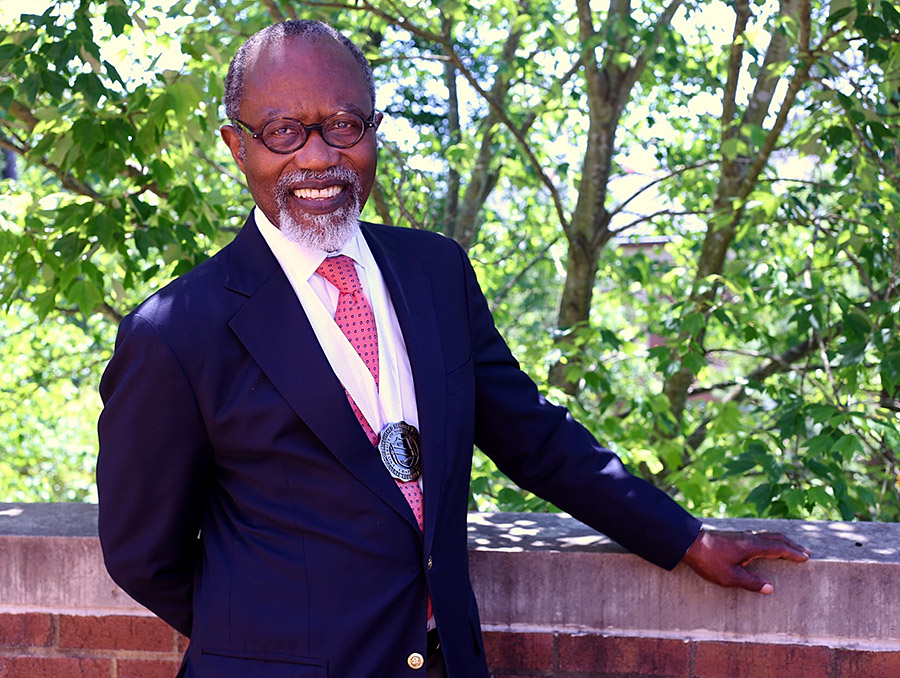Phillip Leroy Clay ’68, Distinguished Service Medal Citation
Posted on May 10, 2018(Editor’s Note: The GAA’s Distinguished Service Medal citations, such as this one, are read to the audience at the Annual Alumni Luncheon and then presented as a keepsake to the recipients.)
As a student, Phil Clay ’68 never got caught in the rain without an umbrella. In a time before you could check the weather on your cellphone, he was always prepared, perhaps foreshadowing his career in planning before he even knew it.

Phillip L. Clay ’68 (Photo by Ray Black III)
Meticulous attention to detail served him well at Carolina and throughout his career, first in city planning, then in academia at the Massachusetts Institute of Technology and culminating in MIT’s chancellorship. Perhaps he felt he had little room for error.
The first in his family to go to college, Phil arrived on campus in 1964 from a segregated high school in Wilmington, one of a handful of African-American students in an otherwise white student body of about 11,300. He didn’t come to Chapel Hill looking for hospitality. Local businesses were lurching grudgingly toward integration after major civil rights demonstrations the year before. He chose a number of opportunities that became positive experiences and steered clear of places where he expected to be unwelcome.
“What you see depends on where you stand, what you do and what you say,” he said. In the causes he took up and the values he defended, he learned the meaning of vision.
As one of the student leaders at a presentation introducing the concept of the Research Triangle Park, he underscored the importance of collaboration between industry and university research in making UNC an icon of the New South. That seems prescient, as the park was in its infancy then.
As a delegate to the National Student Association in the summer of 1967, he was among the kernel of students across the country to propel the Dump Johnson movement to oppose the candidacy of President Lyndon Johnson in the 1968 election.
As a junior, Phil formed Carolina Talent Search, sending students out to high schools around the state to recruit more students of color, something UNC had shown little enthusiasm for and did not fund. The progressive Student Party proposed a bill in the student legislature to cover travel expenses for the program. The Black Student Movement showed up, and the conservative University Party dug in its heels in opposition. Phil, a member of Campus Y, took the floor, and his idealism, integrity and intelligence carried the day. The bill passed. The following year, the number of black students on campus doubled, and doubled again the next year.
“Sometimes if you step forward and articulate your vision, people will fall in behind you,” he said. “They won’t if you’re silent.”
Though Phil never returned to live in North Carolina after serving in Vietnam following graduation — moving to Boston for his doctorate from MIT and staying on as faculty — he kept UNC close to his heart. And vice versa. In 2002, he received UNC’s Distinguished Alumnus Award. The following year, after many of the University’s top administrative posts had been filled with people outside of Carolina, Phil was asked to serve as an inaugural member of the Faculty Development Advisory Group through the Institute for the Arts & Humanities to identify and elevate leaders within the University. The group’s work became an important piece of institutional renewal. Within a few years, the pattern had shifted, and more top positions were filled from within.
In 2007, he began the first of two terms on the Board of Trustees. He invited then-Chancellor Holden Thorp ’86 and Buck Goldstein ’70, Thorp’s co-author on a book about innovation, to MIT to see a program designed to foster creativity.
From the time he was a student, Phil earned a reputation as unflappable, a quiet leader respected by colleagues, even when the message he was conveying was not one they wanted to hear. He maintained a clear, cogent voice for inclusion at a time when that was controversial. He stands by his convictions without losing his composure, attacking others or impugning their motives.
Professionally, he has tackled the complex problem of affordable housing. Until last year, he chaired Community Builders, which found ways to increase the amount of affordable housing in Boston and other large cities. He is a founding member of the National Housing Trust.
Since retiring from MIT in 2011, Phil has turned his attention to advancing colleges in Africa, extending to them the same advice and help that he has given to other universities around the world when he was chancellor. His message offers a certain shelter, his vision a plan for success, almost as if he were still carrying an umbrella.
The GAA’s Distinguished Service Medal citations, such as this one, are read to the audience at the Annual Alumni Luncheon and then presented as a keepsake to the recipients.
